Bruderhof: My dark past growing up in a rural English commune
- Published
Bruderhof leaver "Samantha": 'I thought demons were going to fly out of me'
A group of Christians living together in communes believe their simpler, shared existence is the answer to society's ills. But some former members have told BBC Inside Out their historical experience of growing up inside the Bruderhof's communities has left them psychologically damaged.
"I thought maybe I was evil, maybe some demons were going to come flying out of me. That's what had been drummed into me."
Samantha* carries the scars of her childhood on her forearms. She began self-harming at the age of nine, she says, as "a way to escape" life inside the Bruderhof.
Samantha grew up in a commune set up by the religious group and said she felt forced to conform to its strict teachings on sexual morality and the role of women, which includes a modest dress code.
Over time her mental health deteriorated and in 2002, aged 22, she attempted to take her own life.
She said she was then subjected to what she describes as an "exorcism" at the commune in Beech Grove, a 19th Century manor house set among rolling green fields in Nonington, Kent.
Elders from a commune in the United States were summoned to help with a "laying on of hands" prayer ceremony, she said.
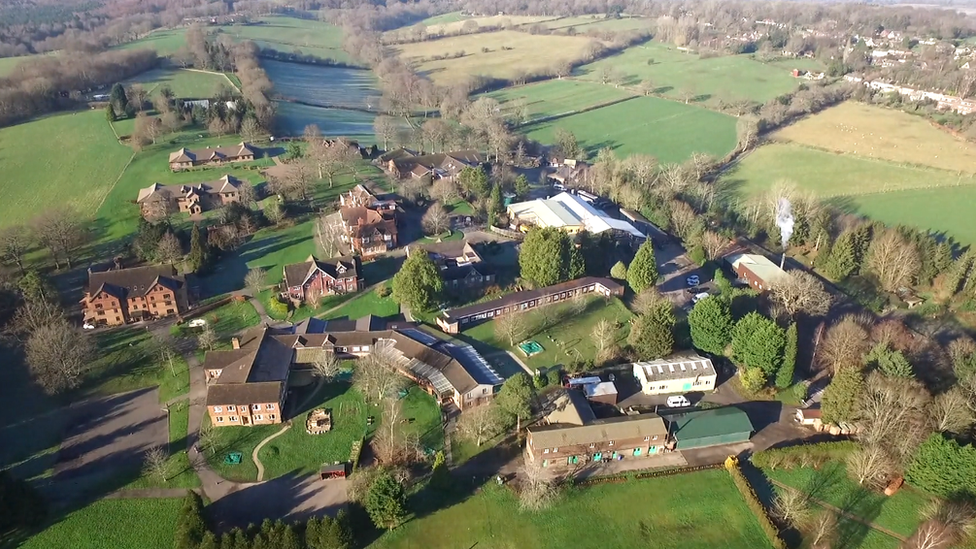
The Darvell commune in Robertsbridge is one of two Bruderhof communities in the UK
As older men gathered around her to pray, Samantha, remembers feeling scared and confused.
"Was I going to spew forth loud words," she recalls thinking at the time.
But nothing happened.
"There was nothing to drive out of me… there were no demons," she said.
Other former members - including people who left the Bruderhof within the past few years - have said they witnessed similar "exorcism" ceremonies for people with autism, cancer and psychosis.
However, the Bruderhof said the term exorcism could not be further from the truth. It said praying for those with illness was an accepted practice and it would never be used as a substitute for medical care.
Samantha was being treated by external consultant psychiatric specialists at the time, the Bruderhof said.
The international community, which has another commune in Robertsbridge, East Sussex, presents a vision of an idyllic, purer life in which dedicated Christians live together.
Members share their income and resources, meaning they are largely free from financial pressures. However, most young people have limited access to modern technology, such as smart phones and social media. There are also strict rules banning "provocative" clothing and sex outside marriage.
Samantha is one of a number of former members who says the pressure to conform to the Bruderhof's teachings has left a legacy of psychological trauma.
The Bruderhof leadership declined to be interviewed, but the community's lawyers responded in writing to several allegations made by former members.

What is the Bruderhof?
The Bruderhof - which means "place of brothers" - was founded as a pacifist movement in Germany in 1920
Members seek to live like early Christians, sharing incomes and handing over all their possessions, which are not returned if they leave
Fleeing Nazi persecution, the group moved to England in 1936 and later to Paraguay to avoid the internship of German citizens during World War Two
Today, they eschew many trappings of modern life and say their communal approach is "a compelling answer to the problems of contemporary society"
Their modest dress, including head coverings for women, is intended to "avoid clothing that indicates status or wealth as well as anything provocative or sexualized"
There are two communes in England, both housing about 300 people, with other sites in Europe, the US, South America and Australia

Several former members said they were punished for having relationships during their teens.
The Bruderhof said it had a "clear commitment to sexual morality", with sex before or outside of marriage viewed as sinful and single members expected to remain celibate.
Clare said she was subjected to a "public shaming" after being caught with a boyfriend in her teens in the 2000s. Her "crimes" were read aloud in front of 200 adults, she said.
"It's just brutal," she said. "People are standing up one by one and condemning you. The shame on the faces of your family around you - it haunts you forever."
Another former member, Cecily, left the Bruderhof at the age of 15 more than 20 years ago.
She said she was humiliated after breaking the rules and speaking to boys from outside the community.
"I remember being stood up at a lunchtime meal… and told I needed to apologise for my behaviour, that I was the spawn of Satan, that I was a parasite on the commune and that I would end up as a whore on the street, that I was a vampire and an evil, evil child - and a witch.
"All sorts of horrible things which stuck with me, you know, to this day because I had to spend years trying to get those words out of my mind."
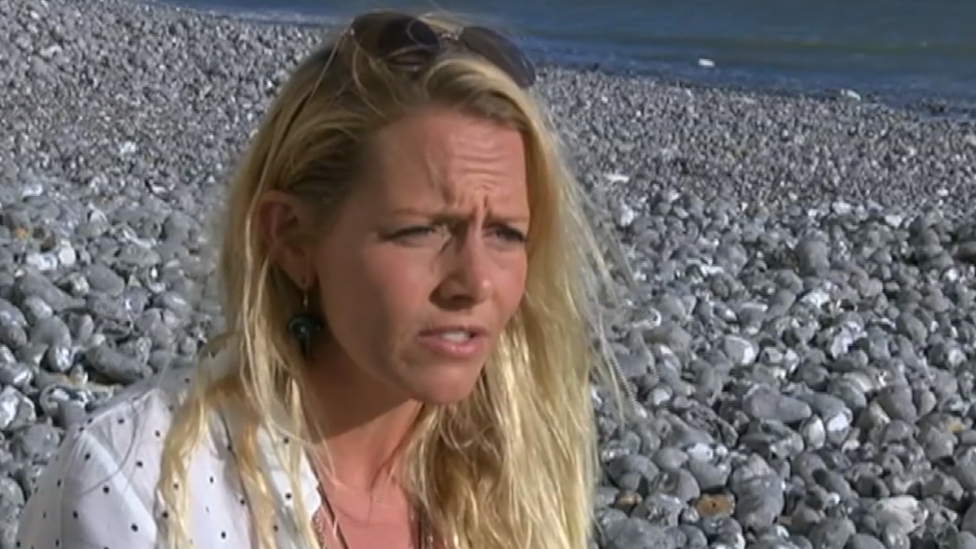
Cecily said she was called "evil" during a public humiliation
The Bruderhof denied using public humiliation as a punishment and said it would never use this sort of "extravagant and improbable" language.
On occasion, "disciplinary infractions" were dealt with in a public setting, the Bruderhof said, but it stressed this was not a punishment. The group insisted it was no different from a school assembly explaining the potential impacts of thefts or fighting.
Another former member, Sean, was 15 when he claims he was isolated and banned from talking to anyone or joining communal meals after it was discovered he had a girlfriend.
"It's really a separation from society," he said. "It came with its fair share of traumas as a child to have to suffer like that as a punishment."
A short time later he was sent to a Bruderhof commune in the US with his family.
Sean believes he was "uprooted and flung across the world" as a punishment.
"They didn't want me to fraternise with my old friends," he said. "It's a very traumatic part of living in the Bruderhof."
The community said it had no knowledge of this allegation but its website said it regularly instructed people to move between communes to meet the needs of different communities.
It said the isolation of children as a disciplinary measure was stopped in 1975, adding it had apologised and regrets children were stigmatised in this way. It said it had no knowledge of these more recent accounts, which it described as "highly improbable".
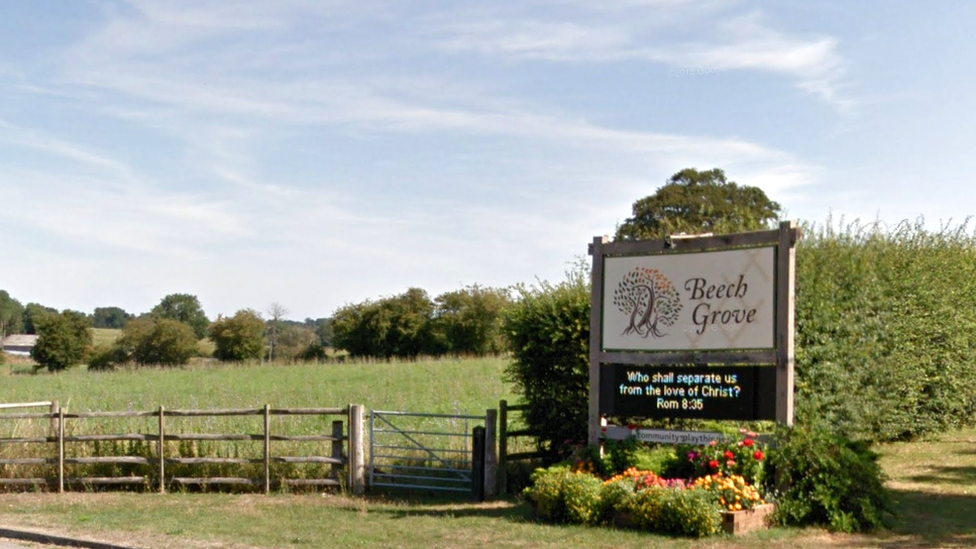
Beech Grove in Nonington is a 19th Century manor house and former sports college
Another former member, Jon, grew up in the community in the 2000s. He described a group that, despite being "repressive" was "obsessed with sex".
"They would just question you about everything… like, 'do you masturbate?'," he said.
In his early teens, he said a senior community figure took him to a sauna and grilled him about his thoughts.
"We had swimsuits on, but I felt weird," he said.
"He undressed - not in a weird way or anything - but having never seen anyone naked before I was like 'woah'. I felt quite trapped with this guy."
Jon, who is gay, said he had to hide his sexuality before leaving the Bruderhof. He said the community's opposition to same-sex relationships had a "terrible effect" on him.
"You can never show your true self, you're always hiding something. It's a horrible way to live."
He said a gay friend who was a fellow member of the Bruderhof had "struggled with this" before coming out and leaving the community. Some years later he took his own life.
"I completely understand that," he said.
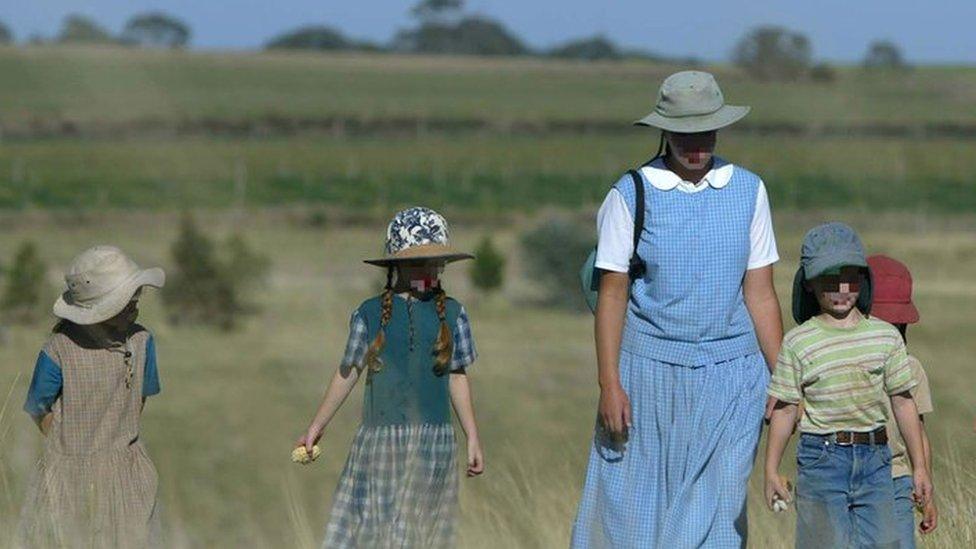
The Bruderhof has communes across the world, including in Australia
The Bruderhof said it was aware that a 26-year-old former member had taken his own life in 2016, eight years after leaving.
It said his sexuality was "acknowledged" and he received loving pastoral support from the community.
The Bruderhof said while gay relationships were not permitted, experiencing "same sex attraction" was not regarded as sinful. It said it had no knowledge of Jon's sauna visit, but that such conduct would be unacceptable.
Many former members the BBC spoke to have taken issue with the Bruderhof's treatment of women. Men typically dress in trousers and shirts, while women cover their hair and wear modest, old-fashioned clothes.
Rachel, who is in her 20s, said it was a "total man's world".
Women were made to focus on cooking, cleaning and childcare, she said.
"[Women] have to wear baggy clothing, it's all in an effort for men not to be attracted to you," she said.
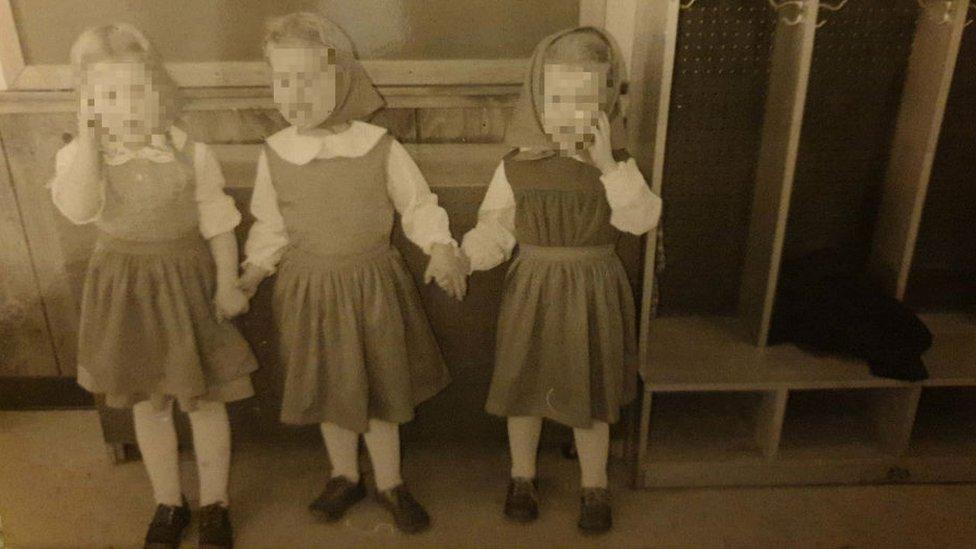
Children attend Bruderhof schools that are inspected by Ofsted
However the Bruderhof maintains women have equal status with men and choose to wear modest clothing. It said women were encouraged in their education as much as men and took on professional roles including medicine and law.
Both of the communes in the UK have their own schools staffed by teachers from the community. They are inspected by Ofsted and the community said Ofsted inspectors found no evidence of any discrimination.
According to the community's website young adults are encouraged to leave the commune and "experience the broader world" before making a voluntary decision to remain.
Whatever their reasons for leaving, former members have said they were not equipped for life on the outside.
Sean said leaving was a "tremendous culture shock."
"You have so little knowledge of what the outside world is like," he said.
Some of those who chose to leave the community in the past 25 years have said they were given limited financial support - in the form of cash or a plane ticket - as they moved into the outside world.
Others said they received nothing.
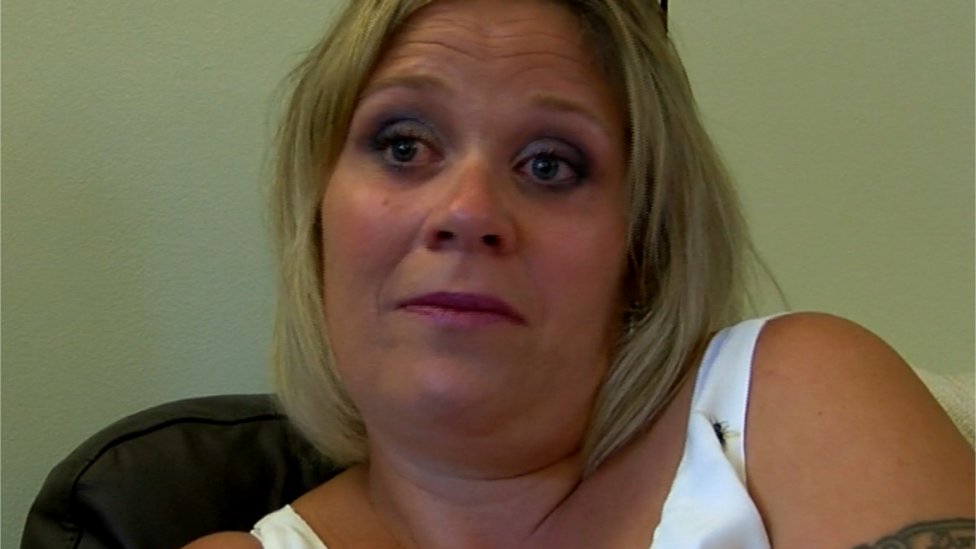
Samantha says her mental health issues were treated with an "exorcism" ceremony
The Bruderhof admits that at some points in the past not enough was done to support former members financially.
Almost $2m (£1.5m) has been paid out to them by a "resource office" which was set up in 2008 and also offers practical advice and support, it said. A number of former members who spoke to the BBC said this had been helpful.
The Bruderhof cited a 2018 Ofsted inspection of the East Sussex school which stated "leaders work hard to ensure that the school's unique setting does not restrict how well pupils are prepared for life in modern Britain".
It added: "Pupils experience regular opportunities to engage with people from beyond their community, both through welcoming visitors to their school and going out on trips."
Life inside the Bruderhof may be simple, but the community is not poor.
Wooden furniture made in the commune's factory buildings is sold to primary schools and last year, the UK arm of its Community Playthings company made a profit of £5m.
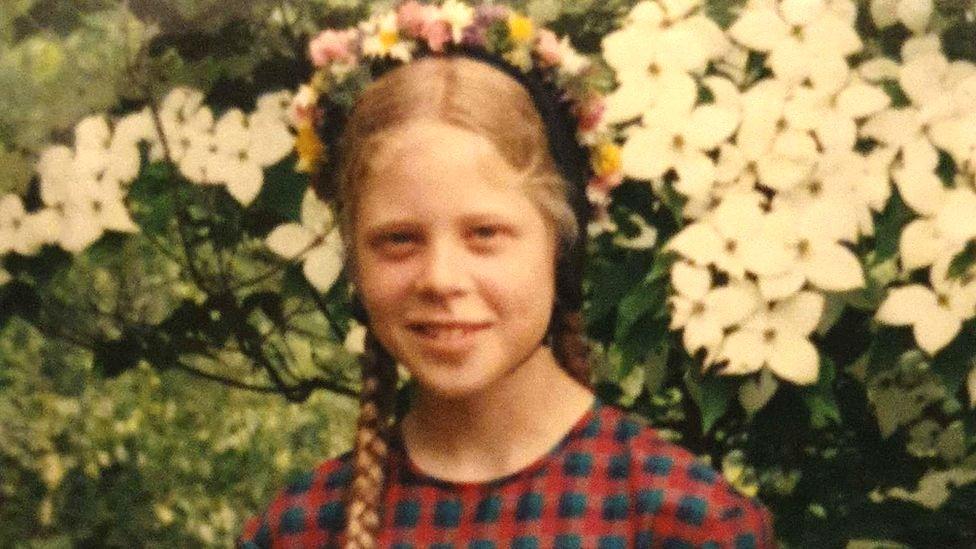
Samantha moved between communes in the US and the UK as a child
Many of those interviewed for this story wished to hide their identities for fear they would never be allowed to see their Bruderhof family members again.
Some have claimed they were denied requests to see their children, parents and grandparents.
One woman said her parents were ordered to burn photos of their children who had left.
The Bruderhof insisted most former members "maintain warm relations" with relatives in the communes and said leavers had never been punished for criticising the community.
It accepted that during some periods "too hard a line was taken regarding visits by those perceived as detractors" but that its policy was now to facilitate requests wherever possible.
But Sean believes he and other leavers are mistakenly viewed by some inside the community as bitter and destructive for speaking out.
"We don't want to destroy the Bruderhof," he said. "We want to reform it."
In a statement, the Bruderhof said the testimony of former members in this story presented a "misleading account" of the community.
"We are an open and welcoming Christian community who, while not perfect, are doing our best to make the world a better place," it said.
"Ofsted has for decades been inspecting the provision we make for our children and has never found any cause for concern. The Bruderhof is 100 years old this year. In that time we haven't got everything right, for which we are sorry.
"We are committed to listening to anyone who feels hurt by their experiences with the Bruderhof."
*Some names have been changed.
You can watch the full BBC Inside Out South East report on iPlayer here.